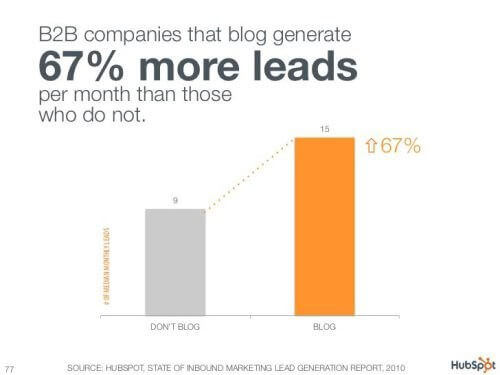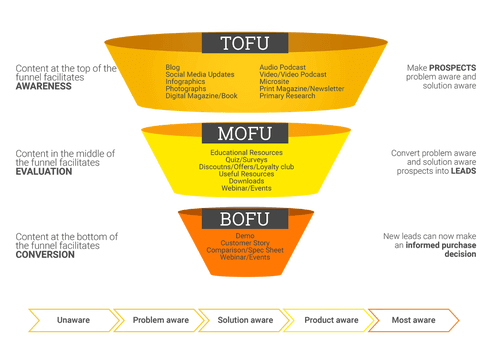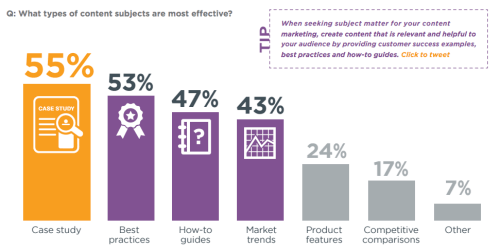The B2B startup space is evolving and if I may use the word, literally exploding with technologies like machine learning and artificial intelligence coming into play. Bravo on the job, but what about making your customers feel the need to use this technology and telling them how you have been building something better? That’s where content marketing for startups has been making its space.
For instance, from just being able to automate a few campaigns for an entire market segment, to now being able to look into every customer on a 1:1 basis, engaging them on a much deeper level and optimizing on the go consistently for better results. How do you convince people to use all these different tools?
I’ll give you an example.
About three years ago, using the word marketing automation amidst people I worked with, meant using tools like Buffer and Hootsuite to schedule a few social media posts. Then the term moved on to include automating email campaigns and then came the push notifications. But now when we talk about these nifty marketing technologies, we break them into two — automation suites and customer engagement suites.
Why? Because there are a number of B2B startups that are making it possible for customers to segregate their tasks based on their end goal.
But do all of these B2B startups succeed? No.
The reason being that they are not able to reach their ideal customers at the right time. They are not able to generate a need for their product. They are not even able to convince their prospects on why they should be moving on from the previous technology.
Think about the time when you had to convince your managers to invest in Buffer for ease of social media management. It’s pretty much similar to that.
So if you’re an early stage startup, one that has just received Seed A funding or an Angel investment, here’s why you need to allocate some resources towards content marketing.
Why content marketing for startups is a must
1. It’s more effective and lasts longer than PR
The very first step that early stage startups take, is go for PR. Yes, you want the world to know about your startup, who it got funded by or what they are building. But come to think of it, what exactly does a piece of ‘news’ article get your B2B startup? Apart from a few website hits for a week or for a month, and a little boost to your brand name in the industry, it doesn’t really help in convincing a customer to try your product.
I do agree, a ‘featured on’ section on the website sure does look good!
Now think about investing in one content piece that addresses the challenges of your target market. You take your time talking to the customers, understand what problems they are facing, the solutions they are using and where they are still not able to reach their goals. Imagine if you got a chance to write the way you would talk to them in person. Definitely more convincing than a sales pitch, right?

That’s the effect of content marketing.
If you write a piece that is in-depth and adds value to your target market in every way, it’s bound to get you results for months and sometimes, even years.
I wrote this post on how to make storytelling work in 2015. It is still one that gets me the most number of connects professionally and definitely plenty followers who want to brainstorm on ideas around content marketing. You can check it out here.
Now imagine if you’re creating such pieces of content with a well documented content marketing strategy, that is aligned with the goals of your startup — from awareness to acquisition. Definitely sounds more promising than a PR article, right?
2. It’s cheaper than all that advertising
Another immediate marketing strategy that I have seen most startups invest in, when they have a few resources in place, are advertisements. Sometimes, they are literally just running ads to get more Facebook ads just because they think they can reach their target market on the platform. Now think about all the other advertisements they start running on other social media platforms and the search engines.
One of the places that I have seen them invest the most in, are Google Ads — all without thinking twice. I’m not saying that the strategy doesn’t work. But I have seen startups invest anywhere upto $500-$1000 in ads that get them just handful of hits, a few demo requests and definitely no where in the line up of their competition who have been in the market longer.

3. It helps you establish expert authority
Why do you love Gary Vaynerchuk, Mari Smith or Ann Handley? They are experts in their own niches and that’s why you trust what they have to say about marketing.
What do they all have in common? They all create valuable content in different formats, that are easy to consume.
Now consistently publishing content that addresses your target market’s concerns and challenges, offers solutions without asking them to ‘click’ on something or ‘subscribe’ to a product and simply focuses on adding more value to them, definitely goes a long way in building up a rapport as well. In short, you need to become their go-to source of information.
Now you might think why you should give away so much value for ‘free’. Here’s why — as aptly explained by Gary Vaynerchuk back in 2015 itself!
4. It helps you build relationships
Outbound marketing tactics aren’t always efficient. You could be sending cold emails or cold calling endlessly on a well curated list, but it might not even result in a 2-minute conversation that is valuable. You might get a decision maker on call, be able to introduce your product to them and even instill a little interest in them. But hitting off on the right note, happens one in ten times.
It is a hit and trial strategy that actually takes up plenty of your resources.
Now talking about content marketing for startups. In this tactic, you’re just minding your own business and offering valuable information to the market. You’re giving without expecting anything in return (refer above), and that’s why the consumer actually engages with you.
If a piece of content adds value to a person that fits your ideal customer persona, wouldn’t it make for a better base for conversation? They know what you’re doing, you’re aware of their interest in the information you offered — you know exactly where to begin and what to talk about on the call, without babbling!
What’s more? You build one stable relationship and you get plenty of word of mouth promotion without you having to push for it.
The goal is not to sell a house. It is to build a relationship of confidence and trust with the customer. #contentmarketing #inboundCLICK TO TWEET
5. It provides easy scaling
Content marketing isn’t like advertising. You don’t need to endlessly keep adding more money to your ads to get results. Sometimes an article that you literally invested just $50 in, can get you 10X more clicks than the ad that cost you $500. It has happened with me a number of times and it is definitely up for you to experiment as well.
With content marketing, you decide your pace and are not competing against a never ending volume on digital platforms that is being choked by other businesses in the same domain. Starting with one article per month to one per week and increasing your frequency as you understand what your customers are loving, it is all in your hands.
Content marketing for startups is one of the most efficient tactics to keep the resources being used, highly optimised. And of course, still get results!
Pro tip. Investing in a full time resource early stage, might not be a wise move. Working with startups for 5+ years and having worked on building teams, outsourcing content writing or even content marketing on the whole, is definitely a wiser move to make.
6. It helps blend marketing and sales
Unlike other startup growth strategies, content marketing can serve multiple goals. You can create content that can help you with brand awareness, and at the same time, be used as a sales collateral in the sales cycle to introduce the need to a prospect.

With content marketing, you can easily blend your marketing and sales efforts. The easy blend leads up to reaching your end goal — awareness, engagement and business development. Pretty much covering every little thing you have been whiteboarding.
One of my favorite content formats here are case studies. They make for wonderful reads for those browsing social media and those that are looking for solutions in marketing; and as the final nudge or the convincers in sales.
Oh and it is not just me, there are others who believe the same.

SOURCELong story, short: Content marketing is your way to reach your target audience on optimised resources and reap results for a longer time. #contentmarketing #inboundmarketingCLICK TO TWEET
Content marketing for startups: How to begin
1. Decide on your objectives
To start with, sit down with your team and chalk out your startup’s growth roadmap. You need to clearly define your objectives for the next three, six and nine months minimum, and see where you can align content.
2. Align content marketing to your goals
Content marketing isn’t going to get you leads right away. But it should be aligned with the short term and long term goals of your startup. So sit down and map out every possible way that content will help your startup grow. Think of it as a case you need to make to the rest of your team for using content and making it an integral part of the startup’s growth strategy.
3. Start small and keep testing
There’s no need to set aside $3000 straight for content marketing. As a startup, you need to follow the same approach of introducing small things into the market, testing and gauging the results they can bring in. For example, try out different content types or ideas. See how your market interacts with a case study vs. an infographic. You’ll know exactly what to spend time on next!
One of the biggest mistakes I see B2B startups make is trying to publish a lot of content in very little time.
4. Give it some time to grow
As a content marketer myself, I have seen how startups tend to lose patience with content marketing. According to most, writing 2 to 4 content pieces should be enough to start bringing in the traffic and leads for their business. But let’s be honest, if I asked you to take a medicine for body ache without giving you a background of how I attained that knowledge, would you trust me?
You need to give content marketing some time and room to start showing results. I’m not saying don’t get into numbers. Measure your impact — see how it helps you grow in traffic, engagement, clicks or even shares; but set realistic goals and keep optimizing your strategy to lead to bigger ones.
5. Be strategic and not just zealous
You may recognize plenty of opportunities where you could write a better content piece than your competitor. But don’t jump the gun! Make SMART goals a part of your content planning. Don’t plan post-by-post; instead, focus on creating a calendar that makes each content piece to your business goal.
If you ask me, content marketing for startups is the way to go for sustainable growth. But gone unplanned or undocumented, the best of content marketing strategies can die on you.
So start by exploring what your competitors are doing, the loopholes they haven’t been addressing, the best content formats that you think can fill these voids and how you can take that content to your audience in a consumable format, that will make them trust you. Take it as a long-term commitment, and not just a campaign.
Originally published on my blog